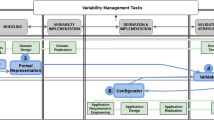Abstract
Selecting components that satisfy a given set of requirements is a key problem in software reuse, especially in reusing between different domains of functionality. This concern has been treated in the ARIFS methodology, which provides an environment to reuse partial and formal requirements specifications, managing the variability implicit in their incompleteness. In this paper, we define generic incomplete specifications, to introduce an explicit source of variability that allows reusing models across different domains, accommodating them to operate in multiple contexts. An extended formal basis is defined to deal with these tasks, that entails improvements in the reuse environment.
Partially supported by PGIDT01PX132203PR project (Xunta de Galicia)
Access this chapter
Tax calculation will be finalised at checkout
Purchases are for personal use only
Preview
Unable to display preview. Download preview PDF.
Similar content being viewed by others
References
Díaz Redondo, R.P., Pazos Arias, J.J., Fernández Vilas, A.: Reuse of Formal Verification Efforts of Incomplete Models at the Requirements Specification Stage. In: Cechich, A., Piattini, M., Vallecillo, A. (eds.) Component-Based Software Quality. LNCS, vol. 2693, pp. 326–351. Springer, Heidelberg (2003)
Díaz Redondo, R.P., Pazos Arias, J.J., Fernández Vilas, A., Barragáns Martínez, B.: ARIFS: an Environment for Incomplete and Formal Specifications Reuse. Electronic Notes in Theorethical Computer Science 66(4) (2002)
Predonzani, P., Succi, G., Vernazza, T.: Tracing Development Progress: A Variability Perspective. In: Extreme Programming Examined, Addison Wesley Professional, Reading (2001)
Girardi, M.R., Ibrahim, B.: Automatic Indexing of Software Artifacts. In: 3rd International Conference on Software Reusability, November 1994, pp. 24–32 (1994)
ISO. LOTOS – A Formal Description Technique Based on an Extended State Transition Model. ISO/IEC/8807, International Standards Organization (1989)
Kiczales, G., Lamping, J., Mendhekar, A., Maeda, C.: Aspect-oriented Programming. In: Aksit, M., Matsuoka, S. (eds.) ECOOP 1997. LNCS, vol. 1241, pp. 220–243. Springer, Heidelberg (1997)
Pazos Arias, J.J., García Duque, J.: SCTL-MUS: A Formal Methodology for Software Development of Distributed Systems. A Case Study. Formal Aspects of Computing 13, 50–91 (2001)
Prieto-Díaz, R.: Implementing Faceted Classification for Software Reuse. Communications of the ACM 34(5), 88–97 (1991)
Schumann, J., Fischer: NORA/HAMMR: Making Deduction-Based Software Component Retrieval Practical. In: Proc. of 12th Conference on Automated Software Engineering (1997)
Svahnberg, M., van Gurp, J., Bosch, J.: A Taxonomy of Variability Realization Techniques. In: Blekinge Institute of Technology, Sweden (2002) ISSN: 1103-1581
van Glabeek, R.J.: The Linear Time - Branching Time Spectrum I: The Semantics of Concrete, Sequential Processes. In: Handbook of Process Algebra, Elsevier Science, Amsterdam (2001)
van Gurp, J., Bosch, J., Svahnberg, M.: On the Notion of Variability in Software Product Lines. In: 2nd Working IEEE/IFIP Conference on Software Architecture (WICSA) (2001)
Ye, Y.: An Active and Adaptive Reuse Repository System. In: 34th Hawaii International Conference on System Sciences (HICSS-34) (2001)
Zaremski, M., Wing, J.M.: Specification Matching of Software Components. ACM Transactions on Software Engineering and Methodology 6(4), 333–369 (1997)
Author information
Authors and Affiliations
Editor information
Editors and Affiliations
Rights and permissions
Copyright information
© 2004 Springer-Verlag Berlin Heidelberg
About this paper
Cite this paper
Redondo, R.P.D. et al. (2004). Supporting Software Variability by Reusing Generic Incomplete Models at the Requirements Specification Stage. In: Bosch, J., Krueger, C. (eds) Software Reuse: Methods, Techniques, and Tools. ICSR 2004. Lecture Notes in Computer Science, vol 3107. Springer, Berlin, Heidelberg. https://doi.org/10.1007/978-3-540-27799-6_1
Download citation
DOI: https://doi.org/10.1007/978-3-540-27799-6_1
Publisher Name: Springer, Berlin, Heidelberg
Print ISBN: 978-3-540-22335-1
Online ISBN: 978-3-540-27799-6
eBook Packages: Springer Book Archive




